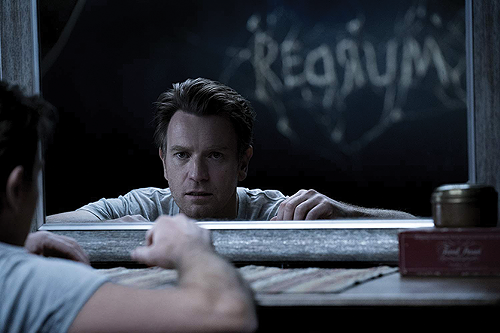Shine On
Doctor Sleep effectively embraces the legacy of The Shining.
By Scott Renshaw @scottrenshawIf you know anything about Stephen King's attitude toward Stanley Kubrick's 1980 adaptation of The Shining, it has been fascinating to consider the interplay between his 2013 sequel novel, Doctor Sleep, and the new film version of that book. King famously hates a lot of what Kubrick did, from the casting to the tone to changes in the ending, and reading Doctor Sleep is an act of watching a creator try to reclaim something that popular culture took from him; at regular intervals, it feels like King is saying to readers, "Remember my book called The Shining? This is a sequel to that."
That makes it particularly surprising to see how much the marketing for writer-director Mike Flanagan's adaptation of Doctor Sleep has leaned into iconic images from Kubrick's movie: elevator doors opening to release an ocean of blood, scary twins, an axe-hole in a bathroom door, etc. Would this Doctor Sleep be a sequel to King's book, or to Kubrick's movie? Or could it somehow manage to be both?
The prologue seems to suggest more of the latter, as we're reintroduced—via re-creations with different actors—to the traumatic events at the Overlook Hotel in 1980 that have followed then-5-year-old Danny Torrance throughout his life. An alcoholic drifter who is hitting rock bottom, the now-adult Dan Torrance (Ewan McGregor) finds himself in a New Hampshire town where he tries to clean himself up and put his supernatural "shining" behind him. But out in the world is a band of ageless vampire-like creatures calling themselves The Knot, led by Rose the Hat (Rebecca Ferguson), preying on young people with similar enhanced abilities. And when Dan realizes The Knot is targeting Abra Stone (Kyliegh Curran), the 13-year-old girl with whom he's been engaging in a psychic correspondence, he realizes he can't hide forever.
Flanagan—who previously adapted King's Gerald's Game, in addition to the popular Netflix The Haunting of Hill House series—has an impressive sense for building simmering menace, rather than launching a fusillade of jump-scares. Instead of underscoring many scenes with music, he opts for the thrum of a heartbeat, yet he also knows when not to be gentle, like with a (trigger warning alert) scene of Rose's crew torturing a child that drives home the horrifying nature of their existence. Flanagan's visual sensibility allows for a real understanding of how these characters' powers manifest themselves, evocative while rarely feeling showy. It might not be conventionally scary, but it works as unsettling storytelling.
A whole lot of that success is thanks to Ferguson, whose interpretation of Rose nails both the classical seductiveness of vampire mythology and the contemptuousness born of thinking of humans as food. She's a phenomenal villain as both a character and a performance, which does threaten to overwhelm McGregor's more muted work. Considering how much of the story's emotional hook depends on whether Dan can feel like he's redeemed himself, his story often seems to take a back seat to the bad guys.
It all comes into focus, however, once the action in the final half-hour turns to Overlook Hotel itself, which involves a host of profoundly risky decisions by Flanagan. He does everything possible to nudge the audience into thinking of Kubrick's movie, even mimicking The Shining's opening shots swooping over a lake before following Dan's car along a winding mountain road. He walks us step by step through meticulously re-created ballrooms and hallways. He casts a Nicholson look-alike for a scene in which Dan wrestles with the family's legacy of alcoholism. And he sets the climactic confrontations with Rose in a snow-covered hedge maze and on a grand staircase (with Dan backing up while wielding an axe, just to emphasize that he has now become the Wendy to Rose's Jack). None of this should work, except to prove the maxim "Never remind people watching your movie of a better movie."
Yet it does work—and, surprisingly, it does so by once again radically re-imagining the ending to King's source material. Doctor Sleep the novel might have allowed King to confront his own history of alcohol abuse, but he also might have been too close to that idea, and to his own disdain for Kubrick's The Shining, to understand how the story really needed to end. Flanagan's Doctor Sleep embraces the legacy of Kubrick's The Shining so that we can watch someone finally bury things from the past that he can't let go. In that sense, maybe it's the story that King needed to tell all along.
More by Scott Renshaw
-
CHALLENGERS feature movie review
Zendaya centers a romantic triangle with a unique relationship spin
- Apr 24, 2024
-
Film Reviews: New Releases for April 19
The Ministry of Ungentlemanly Warfare, Abigail, The Beast, Hard Miles, Sasquatch Sunset and more
- Apr 19, 2024
-
Feature film review: THE BEAST
A filmmaker's compelling ideas get a bit tangled in references to his creative influences.
- Apr 17, 2024
- More »




